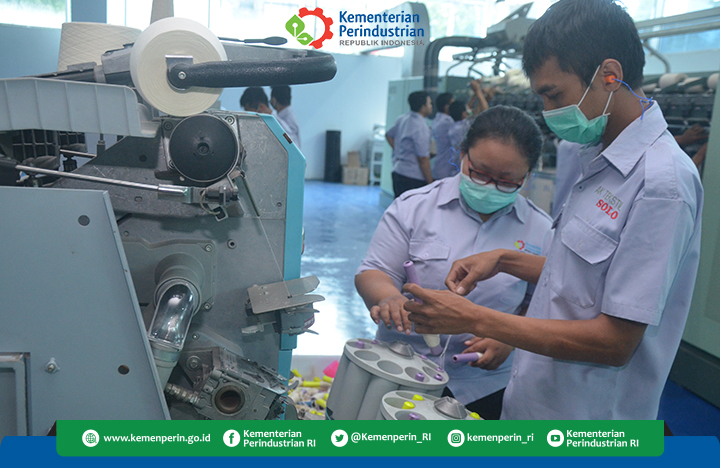Industrial Sector Experiences 23.9% Increase in Investment for Semester I of 2020

Illustration of manufacturing industry. (Photo by: Ministry of Industry)
During the first semester of 2020, total investment in the industrial sector has increased by Rp129.6 trillion or rose by 23.9 percent compared to the Rp104.4 trillion achievements in the same period in 2019.
“The Government is determined to continue to create conducive business climate through strategic policies in order to attract foreign and domestic investors so that they are more confident in investing their capital in Indonesia,” Minister of Industry Agus Gumiwang Kartasasmita said in Jakarta, Tuesday (28/7).
Based on the Investment Coordinating Board (BKPM) data, the industrial sector made a significant contribution to foreign exchange earnings in the January-June 2020 period, contributing 32.2 percent of the total investment value recorded at Rp402.6 trillion.
The five sectors that invested the most during the first six months of this year, namely: the basic metal, metal, and non-machinery industry (Rp45.2 trillion), the food industry (Rp26.6 trillion), the chemical and pharmaceutical industry (Rp19.5 trillion), the non-metal mineral industry (Rp6.1 trillion) and, automotive and transportation industry (Rp6 trillion).
The realization of capital from the industrial sector shows that Indonesia is still the investors’ main destination country for the production base in an effort to meet the needs of the domestic and export markets.
The Minister emphasized that his party has been proactive in attracting potential industrial sector investors to invest their capital in Indonesia, including those who want to relocate their factories. Sectors that have been targeted include labor-intensive, import-substitution, and high-tech industries.
“We encourage this investment to produce substitute-imported goods as well as increase the use of locally produced raw materials and semi-finished goods,” he said. Therefore, it is necessary to create conducive investment climate, including by facilitating the ease of business licenses and granting fiscal and non-fiscal incentives.
According to Agus, in the midst of the impact of the Covid-19 pandemic, there were valuable lessons learned, for example knowing how deep the structure of manufacturing is in the country. “We noticed this because we still need some raw materials or capital goods from other countries, both the upstream and intermediate sectors. So, if the country of origin is shaken, we will also be affected,” he said.
Therefore, strengthening integrated supply chains is important to improve the competitiveness of the manufacturing industry in the country. In this case, the role of investment is quite large in filling the sector vacancy that exists in the national industry.
“We have facilitated the development of integrated industrial estates which could be an opportunity for Indonesia to attract global scale investors,” the Minister said. Over the past five years, there has been an increase in the development of industrial estates in terms of their number and extent.
The Ministry noted that in terms of the number of industrial estates, there was an increase of 40 percent, while in terms of extent, it increased by 16,238.59 hectares. Until now, in the country, there are 112 industrial estates with a total land area of 52 thousand hectares.
“As many as 27 industrial estates are in spurred development until 2024, spread in various regions such as Sumatra, Java, Kalimantan, Sulawesi, Maluku, Nusa Tenggara, and Papua,” he added.
Meanwhile, the Indonesian Industrial Estate Association (HKI) stated that as of June 2020, as many as 50 investors or companies had entered the industrial estate in the country. Chairman of HKI who is also the Indonesia Chamber of Commerce and Industry (Kadin) Vice Chairman for Economic Zones Sanny Iskandar stated that foreign investors dominated the list.
“Of the total 50 investors who entered the industrial estates until June 2020, 29 investors are in the category of foreign investment (PMA) while 21 investors are in the category of domestic investment (PMDN),” he said.
Sanny detailed that the 50 investors entered 17 industrial estates in Indonesia, occupied 139.31 hectares. A total of 29 PMAs occupy 99.44 hectares of land and 21 PMDNs cover 44.87 hectares.
Based on the country of origin, of the 29 foreign investors who entered Indonesia, there are 10 investors from South Korea, 7 investors from Japan, 3 investors from China, 1 investor from the United States, and others. The dominant business opened by new investors is spread across several sectors ranging from automotive and its derivatives. “Then, the food, logistics, chemical, and other manufacturing industries,” Sanny said. (Ministry of Industry PR/EN)
Translated by: Fairuzzamani Inayatillah
Reviewed by: Yuyu Mulyani








